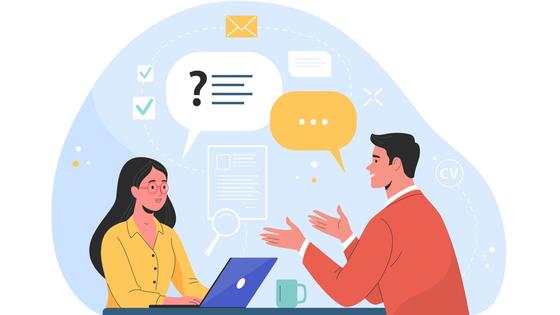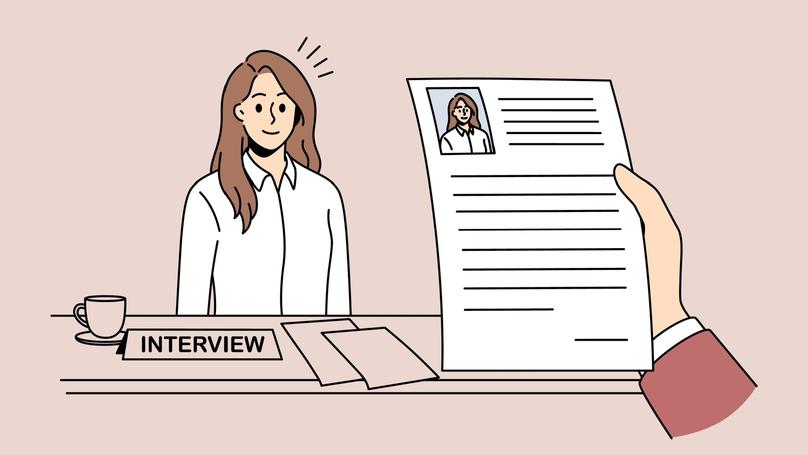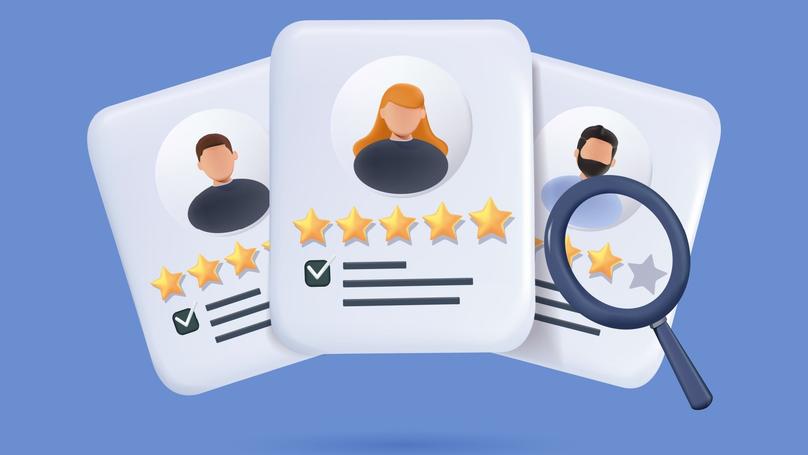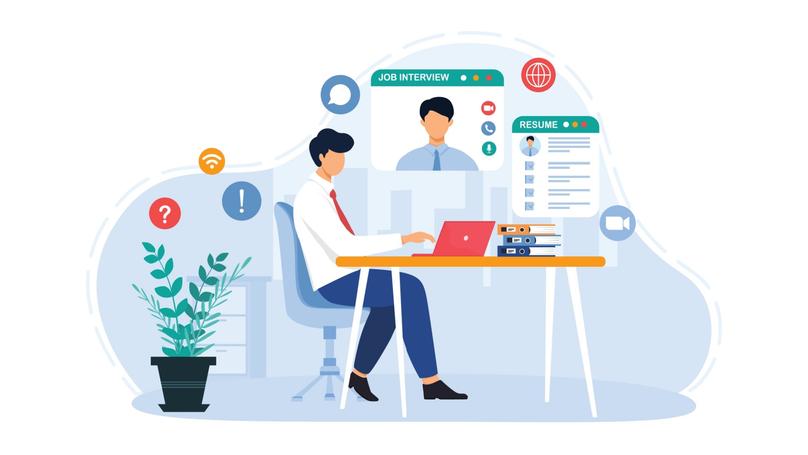How to: how to conduct a job interview if you have never done one before
Life is full of surprises, and sometimes unexpected situations happen, such as stepping in for the HR manager and conducting a job interview.

In that case, when you are faced with this type of situation, we are providing you with some guidelines for interviewing if you're inexperienced and doing it for the first time:
Preparing for an interview

Step 1: Compile a list of candidates you have scheduled interviews with today (there will most likely be several per day). Schedule short breaks of about 20 minutes between candidates. This time will allow you to quickly take note of your impressions of the candidate, rest briefly, and prepare for the next meeting.
Step 2. Decide on an appropriate meeting format. The interview can take place both offline and online. Every location has advantages; the decision depends solely on your preferences and the candidate's abilities. There is no need for an office; the meeting could take place at a coffee shop. The key requirement is a calm and quiet environment, whether you're conducting an interview online or in person, so you and the candidate can focus.
Step 3. Carefully review the candidate's resume immediately before the meeting. Focus on their skills and work experience to avoid asking the candidate about what they mentioned in their resume. For example, if a candidate indicated in their resume that they are familiar with Agile, it would be strange to ask them, "What flexible methodologies do you know?" It would be far more productive to ask them how they have used Agile, how often, etc. Therefore, the questions should be tailored to the candidate's background knowledge.
When reviewing a resume, pay attention to any "blind spots"-those areas that require further clarification or are not fully understood. Interviewing a candidate by someone who doesn't know who they are will also affect your company's attractiveness and reputation.
Step 4: Research your company. Try to prepare for potential questions about the company from the candidate. You are not the only one who makes the decision; the candidate is also. Your goal is to showcase the company to the candidate. Ensure you possess basic information, such as what regulations the candidate must follow, their daily tasks, how many hours there are in a working day, information about bonuses, social packages, etc.
Step 5. Describe the "ideal employee." You must know who you are looking for to fill the vacancy. To achieve this, prepare answers to the following questions (ideally in writing).
-
What role will this employee perform in the company (performer, leader, manager, creative generator, "driving force," etc.?)
-
What will be included in the primary and additional tasks of the employee?
-
What skills, experience, and abilities must they have to perform these tasks confidently?
-
What are you prepared to compromise for the benefit of the candidate? (for instance, overlooking a lack of experience if the employee possesses exceptional skills, or vice versa?)
-
What minimum work experience and skills do you need in a candidate? (list both hard and soft skills)
-
What beliefs, principles, and values should the candidate abide by (if this is important for your corporate culture), and what character traits should they have (communication skills, personality, ability to handle stress, etc.)?
Also, indicate the incentives: monetary, career growth motivation, ideological impetus, a need for stability/social package, etc.
Interviewing with a candidate

Step 1: Introduce yourself to the candidate. They must understand who they are communicating with, so you must provide them with your name and position (if you have yet to interact). Similarly, Discover the candidate's name and incorporate it into the conversation.
Step 2: Start with small talk. For example, discuss the traffic congestion and difficulties with getting to the meeting location, or mention that the holidays are just around the corner, and you have just finished decorating the office for the candidate's arrival. A brief, neutral conversation can alleviate both parties' nervousness and foster trust.
Step 3. Describe the meeting's format. Establish the duration of the interview and the key stages (e.g., the interview, questions from the candidate at the end, and then a test task).
Step 4. Move to questions. Start the interview with a preliminary template, but remember that the questions should be customized based on the candidate's resume and individual traits. This approach will help illuminate any specific areas of uncertainty you identified. Below is a detailed list of acceptable questions.
Step 5. Present your company and answer the candidate's questions. It is your turn after the candidate has responded to all your questions. Please provide additional information about the company, emphasizing its suitability for the candidate based on working conditions, and then ask what the candidate would like to know more about. During the process, evaluate the candidate's preparation. Did they research the company's website and function? Are they already familiar with the product? How basic or, instead, how skilled and precise are the candidate's questions?
Step 6. Assess the candidate and record the results. Once the candidate leaves, write down any strengths and advantages you observed that they did not mention in their resume. Simultaneously, record their weaknesses and what might confuse you about making a decision. You can also briefly describe your overall impressions of the candidate and other thoughts.
What questions should you ask at an interview?

Alternate these questions in sequence, transitioning from one section to the next.
General issues:
-
Why did you apply to our company? Are you seeking something in particular? What criteria did you pay attention to when you made your choice?
-
What do you already know about our company?
-
What prompted your decision to seek a new job or make a career change? What didn't suit you at your last job?
-
What are your current professional and career goals?
Questions about the candidate's experience and previous tasks:
-
Tell me about your most significant and successful project. What role did you play in its implementation? What was the outcome? Can you provide specific numerical details about the results?
-
Could you share a situation where a project or work experience didn't go as planned? Something went wrong. How did you handle this situation? What would you do differently if you could change things right now?
-
Describe your previous work duties. What did you do daily? What was your position like, and where did it end? What tasks did you perform? What challenges did you encounter? What problems did you solve?
-
Describe how you coped with managing a heavy workload. What steps would you take if you had only half an hour before the end of the workday but still had at least five unfinished tasks?
-
What were your objectives in your previous role, and were you successful in achieving them? If so, what strategies did you employ to accomplish them?
Important! Pay attention to the level of responsibility the candidate has demonstrated. Suppose they cannot remember any failures and, at the same time, do not reveal any serious examples. This scenario implies that the individual carried out repetitive and standard duties without demonstrating any initiative.
Questions about salary and expectations:
-
Have you already established your "salary range"? What were your previous earnings in your last position? How much money do you intend to make now?
-
What do you envision as your ideal career? What position do you want to develop in?
-
Have you participated in any vocational training this year? What subjects are you currently studying? What are you trying to put into practice? What steps can you take to develop your soft and hard skills?
-
What areas do you believe you need to develop further? Are there any personal weaknesses you consciously recognize?
Important! The responses received must relate to the capabilities and conditions of your company. Are you ready to offer training to an employee? Are you contemplating individuals still in the "maturation" stage and not yet fully primed professionals? However, can you provide such a professional with the appropriate salary? What kind of employee do you require in nature-composed and dependable or imaginative and curious?
Additional questions to gain deeper insight into the candidate:
-
How do you manage stress? Do you have preferred activities and hobbies that help you replenish your inner reserves?
-
What tools and methods do you use to organize your workday and accomplish all tasks?
-
What achievements or results are you proud of?
-
What do you need to be as productive as possible?
-
Did you encounter any conflicts at your previous workplace? How did you resolve them?
-
What kind of people do you find easier to work with? Why?
-
Did you have any good concepts you couldn't implement in your last job? If so, what were they and why?
-
How did your previous job influence you?
-
What are your hobbies outside of work? What do you love doing most?
-
How do you feel about [name the specifics of your work, for example, calls on weekends]?
Key considerations during an interview

We advise you to consider the following points to ensure the interview is as effective as possible.
What should you NOT ask or say during an interview?
Subjects that are unacceptable during the interview are as follows:
-
The candidate's family intentions include questions such as: Do you plan to start a family? If so, when? Do you have any plans to get married? Why?
-
Nationality and place/conditions of residence. Where are you from? How long have you lived here? Where are your parents from? Grandparents? Are you renting an apartment? "How were you able to buy an apartment?
-
Religion. What religion are you? How often do you attend church? "Do you adhere to certain commandments or fasts?
-
Political views. What do you think about the current situation in the country? Which political party do you support? How do you feel about this political person?
-
Questions about sexual orientation and personal life. What is your orientation? How do you know this? Do you often go on dates? Do you have a romantic relationship?
-
Health. What chronic diseases do you have? How frequently do you get sick? How many days do you usually take sick leave? Will you take sick leave the next time you get sick? When was the last time you visited a doctor?
In most countries, rejecting employees for reasons other than inadequate work experience or unsuitable business qualifications is prohibited. Similarly, no one can guarantee that the candidate will answer personal questions honestly, so there is no point in asking them.
What should you do if you have already realized during the interview that the candidate needs to be more suitable?
Of course, you don't want to waste extra time on a conversation that doesn't produce the desired results. Still, it would be best to stick to the instructions outlined above. You should conclude the interview by presenting your company to all candidates as you would to a well-qualified candidate. You may have to cross paths with this person again, but finish the interviews the same way for all candidates, regardless of their plans. This will also enhance the brand's reputation and your own.
Lectera’s Online Courses by topic
How long should the interview take?
On average, interviews last 30-40 minutes. The duration should be at most an hour. Set a timer or make a time limit in the application (if you are conducting an interview online) to avoid going over time.
Is it necessary to provide the candidate with feedback right away?
If you still need to decide, it's best to hold off. Your decision also hinges on whether you will express your refusal directly to the person involved. Of course, being honest and providing a timely response is appreciated. This approach ensures that candidates do not linger in uncertainty and can actively pursue other job opportunities. If you are ready to say "no," say it immediately. In an ideal scenario, providing reasons for your refusal, such as lack of experience, skills, and divergent views/conditions/plans, is worthwhile. Sometimes, candidates may propose a compromise and demonstrate a willingness to adjust to your requirements. Determine beforehand if you are prepared to consider this option.
Is it worthwhile assigning a test task?
For several reasons, the test should be given at the very end of the interview. First, it will prevent potential candidates from being discouraged by the work needed for an interview. Secondly, suppose you discover during the interview that a different candidate would be better suited to your needs. In that case, a test task will not be necessary. It's an optional practice, typically more relevant for creative roles. For instance, incorporating a test task can be beneficial when seeking a designer, editor, or artist.
Create detailed technical specifications beforehand and thoroughly discuss implementation conditions, deadlines, and other pertinent details. If multiple candidates are equally suitable and you struggle to decide, consider assigning a test task.
Why and how should you focus on motivation?
Motivation is the reason a candidate wants to work for you. It is a driving force that fulfills their basic needs, forcing them to look for work (sooner or later, this will happen). Also, motivating an employee minimizes staff turnover and increases the likelihood that they will become integral to the team. Give preference to candidates with non-material motivations, such as the need for stability or being part of a friendly team.
Share this with your friends via:
Latest News

In the UK, £23 million has been allocated for the expansion of the EdTech Testbed program — pilots of educational technologies in schools and colleges.

In the US, Tuskegee University announced the launch of Tuskegee University Global Campus (TUGC) — a new online platform for distance learning.

A significant stage in the development of the alternative education system has begun in West Northamptonshire in the UK: the County Council is actively calling on parents, guardians, and trustees to participate in shaping the future of this key area.

Outwoods Primary School in Atherstone, Warwickshire, having experienced deep sadness after the loss of their famous cat, Silla, has found solace in a new pet – a Maine Coon named Aloysius O’Hara.

In modern universities, artificial intelligence, and in particular ChatGPT, is rapidly transforming from a controversial tool into a full-fledged student assistant.












 Spring skills audit: what to remove, strengthen, and “sow” in learning
Spring skills audit: what to remove, strengthen, and “sow” in learning
 9 Career Mistakes Young Professionals Make
9 Career Mistakes Young Professionals Make
 £23 million allocated for the expansion of EdTech Testbed in the UK
£23 million allocated for the expansion of EdTech Testbed in the UK
 Test: How Psychologically Mature Are You? Check Your Inner Foundation.
Test: How Psychologically Mature Are You? Check Your Inner Foundation.
 Test. Check Your Social Media Dependency Level!
Test. Check Your Social Media Dependency Level!
 Test: What Business is Right For You?
Test: What Business is Right For You?
